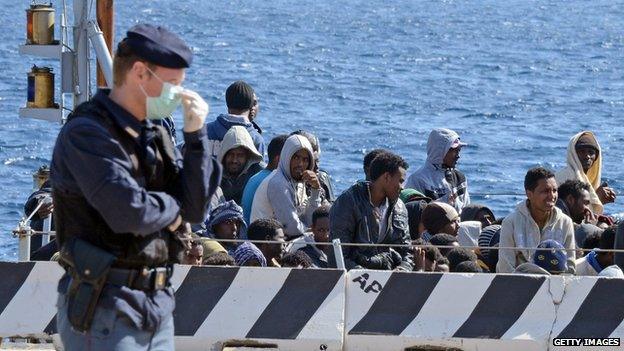Reality Check: Is Libyan migrant crisis the UK's fault?
- Published

UKIP leader Nigel Farage says David Cameron's involvement in the toppling of Libyan leader Muammar Gaddafi in 2011 is a direct cause of the migration disasters in the Mediterranean. Is he correct?
In a BBC interview, Mr Farage blamed the "fanaticism of (former French President) Sarkozy and Cameron to bomb Libya", for destabilising the country.
The coalition against the Gaddafi regime brought together a range of world powers. On 17 March 2011 - after the Gaddafi regime's brutal crackdown on protesters inspired by the Arab Spring - the UN Security Council adopted Resolution 1973 authorising "all necessary measures" to protect civilians in Libya. It was swiftly followed by the Nato-led military intervention that was backed by many European states, the US and Arab countries. And in the UK, there was all-party support for the UN action, with Parliament voting 557 to 13 in favour. So although as prime minister, David Cameron led the UK into the coalition and was happy to join President Sarkozy in a victory lap through Libya, it would be unfair to say he was wholly responsible for the events that lead to Gaddafi's fall.
However, the international community's failure to maintain a commitment to Libya after the removal of Colonel Gaddafi has undoubtedly been a factor in the continuing destabilisation of the country. Currently, two parallel governments lay claim to rule Libya, and the country is overrun with rival militias exploiting the political vacuum. In this environment, migrants have been able to move freely, and the human traffickers operate with impunity. Libya is a key port of entry and departure as it has 1,200 miles (1,900km) of Mediterranean coastline and land borders shared with six countries.
In the final years of the Gaddafi regime, several agreements were signed with European Union states to control migration from Libyan shores, all of which lapsed after the regime collapsed. Before 2011, migration to Europe across the Mediterranean was in the low tens of thousands. In 2011, it increased to 63,017 and by 2014 there were 219,000 reported to have made the crossing.
In November 2013, Italy started a search-and-rescue operation in the Mediterranean in response to the drowning of more than 300 migrants off the Italian island of Lampedusa. The mission was mainly paid for by Italy. Italy stopped the mission in November 2014 and the EU decided to replace it with a much smaller mission, which is a border control mission not a search-and-rescue operation. Following the change, there has been an increase in migrant deaths at sea. Following this week's tragedy the prime minster has pledged to support EU efforts to step up search-and-rescue operations in the Mediterranean.
While the upsurge in migrants choosing to leave Libyan shores is driven by the anarchic situation in the country, a look at who is taking to the boats tells us a wider story about the people on the move. The migrants are not just from Libya, but from across the Middle East, sub-Saharan Africa and the Asian sub-continent, with a multitude of reasons to leave such as war, poverty or simply the search for a better life. All of which suggests that the perfect storm in the Mediterranean is hard to lay at the feet of one politician in Northern Europe.

Election 2015 - Reality Check

What's the truth behind the politicians' claims on the campaign trail? Our experts investigate the facts, and wider stories, behind the soundbites.
Read latest updates or follow us on Twitter @BBCRealityCheck, external
